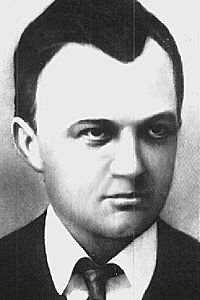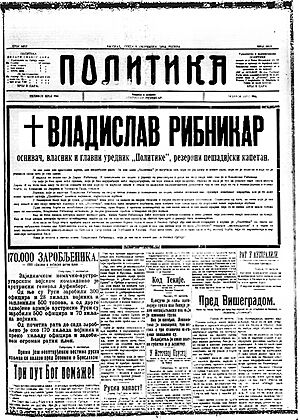Vladislav F. Ribnikar facts for kids
Quick facts for kids
Vladislav F. Ribnikar
|
|
|---|---|
 |
|
| Born | 13 November 1871 Trstenik, Principality of Serbia |
| Died | 1 September 1914 (aged 42) Sokolska planina, Carina, Kingdom of Serbia |
| Resting place | Dormition of the Most Holy Mother of God Serbian Orthodox Church, Pecka |
| Occupation | Journalist, editor |
| Nationality | Serbian |
| Alma mater | University of Belgrade Faculty of Philosophy |
| Notable works | Founder of Politika |
| Spouse | Milica Čolak-Antić |
| Children | Danica Nana Ribnikar Jovanka Vesa Ribnikar |
| Relatives | Darko F. Ribnikar (brother) |
| Military career | |
| Allegiance | |
| Battles/wars | Balkan Wars
|
Vladislav F. Ribnikar (Serbian Cyrillic: Владислав Ф. Рибникар; 13 November 1871 – 1 September 1914) was a famous Serbian journalist. He is best known for starting Politika, which is the oldest daily newspaper in Serbia. He was in charge of the newspaper from when it began in 1904 until he died in battle during the First World War.
Contents
Early Life and Education
Vladislav F. Ribnikar was born in Trstenik, Serbia in 1871. He was the oldest of three sons. His father, Franjo Ribnikar, was a doctor from Slovenia. His mother, Milica Srnić, was Serbian.
Vladislav went to school in Jagodina and Belgrade. He studied the history of philosophy at the University of Belgrade from 1888 to 1892. After finishing his studies there, he went to France. He earned his master's degree from the Sorbonne in Paris. Then, he went to Berlin to study at the Humboldt University. He received a special scholarship from the government to help him with his studies.
Starting the Politika Newspaper
A big change happened in Serbia in May 1903. This event, called the May Coup, ended the rule of the Obrenović royal family. A new royal family, the Karadjordjevics, came to power. This change brought more freedom for people to express their ideas, including in newspapers.
Vladislav F. Ribnikar had seen how newspapers worked in France and Germany. He decided to start the first truly independent newspaper in Serbia. This was a new idea because most newspapers at the time were linked to political groups. People thought an independent newspaper could not survive without political support. There were already eleven daily newspapers that belonged to different political parties.
Vladislav's wife, Milica "Milka" Čolak-Antić, strongly believed in his idea. She was from an important family and used her own money to help start the newspaper.
The first issue of Politika came out on 25 January 1904. They printed 2,450 copies. In just a few years, Politika became the most important daily newspaper in Serbia. Vladislav's younger brother, Darko, and his other brother, Slobodan, also joined the newspaper.
Military Service and Death
Vladislav Ribnikar was a reserve officer in the Royal Serbian Army. He fought in the Balkan Wars between 1912 and 1913. He was hurt twice during these wars. He was wounded near Edirne in 1912 and near Bregalnica in 1913.
When the First World War started, he was called back to serve again. Vladislav Ribnikar was killed in action on 1 September 1914. This happened in western Serbia, in the Sokolska planina mountains. Just one day before, his youngest brother Darko, who was also a reserve captain and the editor-in-chief of Politika, was killed by an enemy shell.
On 2 September 1914, Politika announced the death of its founder with a large headline. After the Ribnikar brothers died, Vladislav's wife, Milica Čolak-Antić Ribnikar, kept the newspaper going. She even sold her family jewelry to get money for it. To raise more funds, she sold their family home in Dedinje, Belgrade. The Serbian royal family later built their residence, the White Palace, on that land.
Legacy and Remembrance
After the Ribnikar brothers died, a famous writer named Isidora Sekulić wrote a poem. It was published in Politika in September 1914. In Trstenik, where Vladislav was born, there is an event called "Ribnikar Day" (Ribnikrevi dani) held in his honor. There is also a street named after Vladislav Ribnikar in Trstenik.
 | Madam C. J. Walker |
 | Janet Emerson Bashen |
 | Annie Turnbo Malone |
 | Maggie L. Walker |


